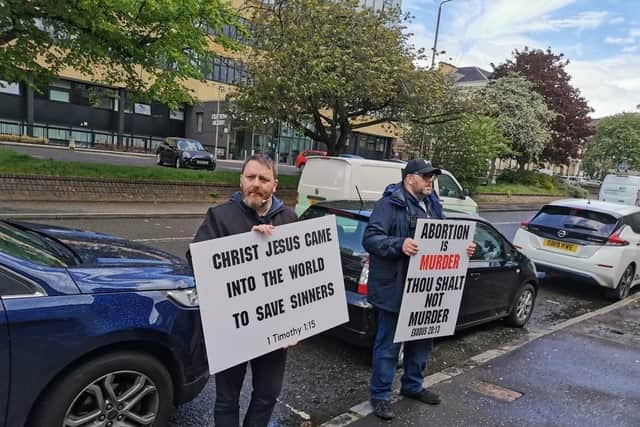Abortion Scotland: 'Men have taken control from us in really harmful ways' says sexual assault survivor as calls for misogyny to be addressed in anti-abortion protests
Professor John Devaney, an academic in gender-based violence, said anti-abortion protests contain “deep-seated misogyny” which needs to be addressed.
The professor at the University of Edinburgh also claimed such protests should be considered if legal reforms to protect women from abuse are introduced.
Advertisement
Hide AdAdvertisement
Hide AdThe academic’s comments come as anti-abortion protests continue in Scotland despite calls for the Scottish Government to introduce 150-metre buffer zones around clinics and hospitals.


Nicola Sturgeon is to hold an abortion care emergency summit on Monday following concerns over the impact protests are having on women.
However, groups and politicians last week raised concerns this is a “performative” event from the government during a time requiring “urgent action”.
The report, “Misogyny – A Human Rights Issue”, published earlier this year calls for the creation of a Misogyny and Criminal Justice (Scotland) Act, which would create a statutory aggravation of misogyny.
The report would also create offences of stirring up hatred against women to tackle, amongst other things, the threat from extremist groups.
Professor Devaney, who is part of the Scottish Government working group on the misogyny report, said: “Given it’s women that have abortions and it’s predominantly men standing outside harassing and intimidating them, I think that is a very clear example of misogyny.”
He said many campaigning on religious grounds are protesting for much more “deep-seated and misogynistic” reasons.
Dr Pam Lowe, an expert in reproductive and sexual health from Aston University, conducted five-year research on anti-abortion protests in the UK. This showed most protesters are “conservative Christians” who see all women as mothers.
Advertisement
Hide AdAdvertisement
Hide AdProfessor Devaney said: "Misogyny is rooted in patriarchy and it’s about the predominance of men’s views and attitudes in society.
"We see that in a number of religions. There are these attitudes towards women and their role in society and the role of men in being able to tell women what their role is. That then gets extended into areas which are wholly about women such as their reproductive health.
“There are people professing to ensure women are making informed choices by trying to ensure they have fewer access to services than they would otherwise have and that’s clearly misogynistic."
Outside Glasgow’s Sandyford Clinic there has been a regular protest by two men.
Rachel Plummer, who uses the My Body Back project at the clinic told Scotland on Sunday the impact the “misogynistic” protest had on her.
The My Body Back project delivers cervical smears to survivors of rape and sexual abuse and is supported by counsellors and specialist staff.
Rachel, a survivor of sexual assault, said: “I saw the videos of the two men on social media and it made me feel anxious about going.
"The clinic phoned me on the day of my appointment and fortunately they weren't outside. It was just ridiculous because you have to make these appointments months in advance due to demand for the service.”
Advertisement
Hide AdAdvertisement
Hide AdRachel fears the “male aggression” is not just upsetting her but other women, including those going through abortions.
"People accessing this service are survivors of rape and to have two men outside shouting at you and filming you is totally traumatic and so aggressive”, Rachel said. “Men have taken control away from us in really harmful ways.”
Asked if she would have gone to her appointment if both men were outside, Rachel said she was not sure but the process would have been “incredibly difficult and upsetting”.
She said: "Establishing trust is a large part of the service provided. To throw this into the mix, undoes all the care being provided.”
Asked what men can do to support women who fear harassment from protests, Prof Devaney said: “Men should continue to call other men out for their behaviour and use positions they have in organisations and churches to try and ensure there is a more informed debate about these issues and there are other ways to go about this which don’t focus on intimidation or bullying.”
Lucy Grieve, co-founder of Back Off Scotland, said it was “crucial” for men to understand and support the campaign to introduce buffer zones across Scotland.
Ms Grieve said: “We’ve spoken to a lot of men since 2020 about the buffer zone campaign and have been pleasantly surprised by how much support we’ve received.”
The group has received testimonies from men including one male porter from the Queen Elizabeth who has now quit the healthcare profession. He cited the protests as “one of the deciding factors” for leaving.
Advertisement
Hide AdAdvertisement
Hide AdThe former porter said: “I was the only man in a room full of vulnerable women. Due to Covid, they were separated from their partners and families. Some were sexual assault victims, other girls from abroad had been trafficked into the sex trade.
“One night was particularly bad and the protesters were outside the entrance at 9am. Some of the women and staff didn't want to leave for fear of being harassed.
"I waited back an hour after finishing. I was so stressed and angry I didn't know what I would do or how I would react.”
Ms Grieve added: "We’ve heard from male doctors, partners of women affected by the protests, as well as fathers, brothers, and uncles of those who have had to run this gauntlet, and they are all united in the bitter disappointment that this is still going on today in Scotland.”
Comments
Want to join the conversation? Please or to comment on this article.
